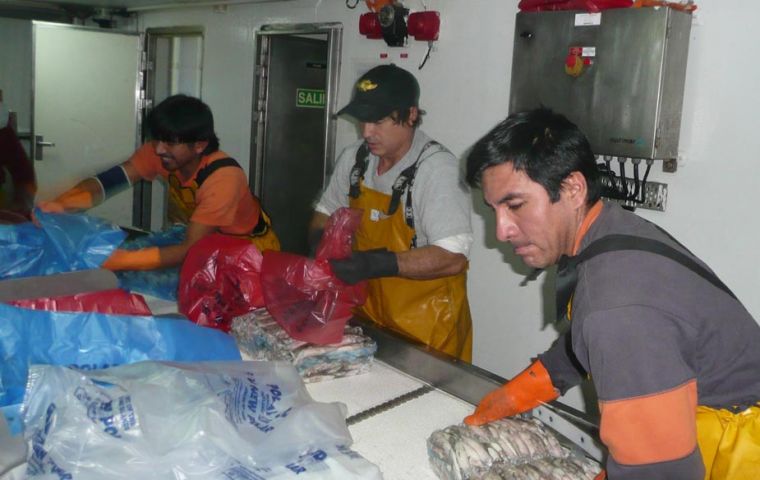MercoPress. South Atlantic News Agency
Falkland Islands: First loligo season of the year the ‘best since 2000’
 Crewmen on board the New Polar, jointly owned by Seaview and Polar Ltd, loading catches of loligo
Crewmen on board the New Polar, jointly owned by Seaview and Polar Ltd, loading catches of loligo FISHING companies are celebrating the best loligo season for ten years, with catches over the past seven weeks exceeding 28,000 tonnes.
The first season of the year ended on Wednesday, and local companies contacted by the Penguin News were delighted, with one boss saying: “It’s been the best since 2000.”
“There’s been good quality squid and plenty of it,” said Alex Reid of Seaview, an opinion widely repeated across the industry.
If this year’s season so far can be described as “the best since 2000” the fact that last year’s season closed early because catches were particularly bad, leads to the hope that when this year’s catch hits the market, it will not have to compete with large quantities of loligo still in cold storage from earlier seasons, and should fetch a good price.
Last season’s catch was just 13,000 tonnes.
Tom Blake of RBC said companies would naturally try to sell the earliest caught fish first, but it was not unusual for loligo - the Falklands native squid which turns up on plates in Spain as “calamares” – to remain in cold storage for eight or nine months and, if stored at a constant -25C, it could remain good for as long as 18 months.
Beauchêne Fishing’s final loligo shipment will be containerised in Stanley this weekend, the company’s third transhipment in this manner this season.
Managing Director Cheryl Roberts, said containerisation had worked very well this season and saw it as “the way to go” in the future.
Most of the trawlers involved have now either turned their attention to other species, or are already heading for lay-up in Montevideo or Vigo. The second loligo season is due to start on July 15, but the level of availability of squid to be caught then is difficult to assess, says Director of Natural Resources, John Barton.
Some prediction models, based on variables such as water temperature are available, said Mr Barton, but these were unreliable. It is expected the Fisheries Department will carry out a pre-season survey cruise in early July to enable a more accurate assessment to be made.
But while the loligo crews and companies were happy, the same could not be said of those fishing for illex.
Less than half way through what used to be a four-month season, it is not living up to its early promise, and already some of the 75 or so vessels which took up licences have left the zone, with others expected to follow, either going to other fisheries or returning to home ports, according to Natural Resources Director John Barton.
The season, which at the beginning promised a return to something approaching normal catch levels, now appears to be petering out. Up until the start of last week, the total reported catch was 11,500 tonnes – better than last season, but a long way short of the 100,000 to 150,000 tonnes caught in good years, said Mr Barton.
Had catches justified the recent increase in interest in buying illex licences, in budgetary terms this could have been a reasonable year for the Falkland Islands Government, he said.
But under the current licensing rules for the Falklands biggest value catch, “some refunding will be inevitable.” Asked whether the knowledge that refunds would be made if catch levels were poor might prove a temptation to vessels to report smaller catch quantities than they were actually taking, Mr Barton admitted it might be a possibility.
However, while observer cover was low on jiggers, the Fisheries Department tried to get on as many vessels as possible to carry out inspections at sea, and it was clear there had been much less transhipment activity than would be normal in a good or even average year.
Stuart Wallace, whose company Fortuna was recently represented at the International Boston Seafood Show, said that the absence of smaller illex squid in the market might help to maintain a reasonable price for this season’s loligo catch with which it sometimes competed.
But he said nothing could be accurately predicted about the loligo price, as most of the catch was still on its way to market. (Penguin News)




Top Comments
Disclaimer & comment rules-

-

-

Read all commentsPrivate vessel on behalf of the spanish gov????
Apr 18th, 2010 - 10:15 am +1Yes, but the Spanish government is not stopping them - and they would be if their boats were illegally fishing in “Argentine” waters, no?
Jihad Jorge pleaded “Give me a break!!!!”
Apr 18th, 2010 - 11:19 am +1Many have - you squandered them. Instead you showed your true colours in that you are a lying, foolish, violent and somewhat unstable little man....as your next few posts will prove.;-)
J.A. Roberts wrote “Yes, but the Spanish government is not stopping them - and they would be if their boats were illegally fishing in “Argentine” waters, no?”
Apr 18th, 2010 - 11:21 am +1Now , now - you will only cause Jihad Jorges little brain to explode if you post such questions;-)
Commenting for this story is now closed.
If you have a Facebook account, become a fan and comment on our Facebook Page!